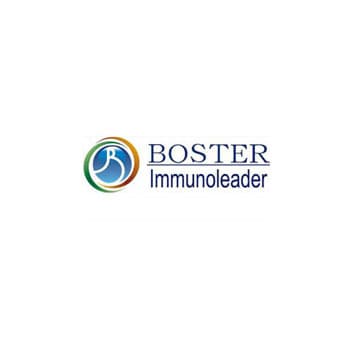
Supplier:
BOSTER IMMUNOLEADERCat no: PA1708
Polyclonal Anti-LALBA
Prices direct from BOSTER IMMUNOLEADER
Quick response times
Exclusive Biosave savings/discounts
SPECIFICATIONS
Price
200.00 USD
Catalog Number
PA1708
Size
100ug/vial
Applications
IHC, WB
Reactivities
Hum
Form
Lyophilized
Format
Each vial contains 5mg BSA, 0.9mg NaCl, 0.2mg Na2HPO4, 0.05mg Thimerosal, 0.05mg NaN3.
Gene Id
LALBA
References
1.Bounous, G., Kongshavn, P. A. L., Taveroff, A., Gold, P. Evolutionary traits in human milk proteins. Med. Hypotheses 27: 133-140, 1988.\n2.Davies, M. S., West, L. F., Davis, M. B., Povey, S., Craig, R. K. The gene for human alpha-lactalbumin is assigned to chromosome 12q13. Ann. Hum. Genet. 51: 183-188, 1987.\n3.Hakansson, A., Zhivotovsky, B., Orrenius, S., Sabharwal, H., Svanborg, C. Apoptosis induced by a human milk protein. Proc. Nat. Acad. Sci. 92: 8064-8068, 1995.\n
Swiss Prot
P00709
Storage Temp
At -20 degree C for one year. After reconstitution, at 4 degree C for one month. It can also be aliquotted and stored frozen at -20 degree C for a longer time.Avoid repeated freezing and thawing.
Additional Info
A synthetic peptide corresponding to a sequence at the N-terminal of human LALBA.
Scientific Background
LALBA(lactalbumin, alpha or alpha-lactalbumin) is a protein that in humans is encoded by the LALBA gene. The LALBA gene is mapped on 12q13.11. alpha-Lactalbumin is an important whey protein in cow's milk (~1 g/l), and is also present in the milk of many other mammalian species. In primates, alpha-lactalbumin expression is upregulated in response to the hormone prolactin and increases the production of lactose. alpha-Lactalbumin forms the regulatory subunit of the lactose synthase (LS) heterodimer and beta-1, 4-galactosyltransferase (beta4Gal-T1) forms the catalytic component. Together, these proteins enable LS to produce lactose by transferring galactose moieties to glucose. As a multimer, alpha-lactalbumin strongly binds calcium and zinc ions and may possess bactericidal or antitumor activity. A folding variant of human alpha-lactalbumin that may form in acidic environments such as the stomach, called HAMLET, probably induces apoptosis in tumor and immature cells.
More from BOSTER IMMUNOLEADER
Applications
IHC, WB
Reactivities
Hum
Applications
IHC, WB
Reactivities
Mouse, Rat
Applications
ELISA, WB
Reactivities
Mouse
Applications
WB
Reactivities
Hum, Mouse, Rat
Applications
IHC, WB
Reactivities
Hum
Latest promotions
Spend less time on DNA cleanup so you can do more science. The MSB Spin PCRapace is the fastest way to purify your DNA from PCR, restriction digestion, and...
New brilliant antibodies, and new lower prices!For flow cytometry reagents in general, \"bright is better.\" The violet-excitable BD Horizon™ BV421 and...
As an incentive to qualify our BSA, we are offering a 20% discount when you purchase your first 100g, 500g or 1000g of any grade of Bovine Serum Albumin....
It is not every day that you are given something for nothing. We are giving away additional spectrophotometer software.Cecil Instruments have enhanced the...
We're so sure that you'll prefer Cayman Assay kits over your present brand that we're willing to give you a free assay kit to prove it!
10% Discount on 2 Rabbit Polyclonal Antibody Service. With over 20 years experience, SDIX has developed into the premier US custom antibody producer,...
For the past decade scientists have extensively used ATS secondary toxin conjugates to make their own targeted toxins for in vitro use.The ability to combine...
Did your supplier increase the price of Fetal Bovine Serum? Did they substitute the US Origin with USDA? Well say no more! Innovative Research is still...
Bulk Cytokines with Custom Vialing.20 - 50% off cytokines, growth factors, chemokines and more...For a limited time Cell Sciences is offering substantial...
Jenway’s 73 series spectrophotometer range provides four models with a narrow spectral bandwidth of 5nm and an absorbance range of –0.3 to 2.5A,...
Are you planning to have a customised antibody made for your research?Since 2000, Everest has been producing a catalog containing thousands of affinity...
Top suppliers
United States Biological
230753 products
Carl Zeiss Microscopy
27 products
Promega Corporation
11 products
Panasonic Healthcare Company
5 products
Life Technologies
1 products
Nikon Instruments Europe
11 products
Olympus Europa Holding GmbH
3 products
Leica Microsystems, Inc.
10 products
GE Healthcare Life Sciences
2 products
Tecan Trading AG
19 products
Beckman Coulter, Inc.
1 products
AB SCIEX
3 products
BD (Becton, Dickinson and Company)
1 products
RANDOX TOXICOLOGY
5 products
Randox Food Diagnostics
6 products


















